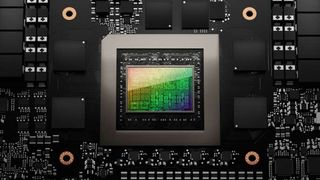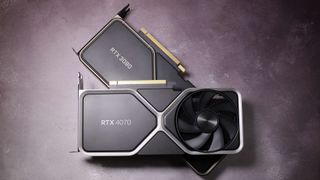Nvidia's 'high-end' Arm-based chip for PCs will reportedly go into production in 2025
Nvidia's CPU-GPU could be killer for laptops and gaming handhelds.

The idea that Nvidia is plotting an Arm-based chip for the PC is not news. But the latest coverage from DigiTimes (paywall) claiming that the chip is targeted at the "high end" and goes into production in less than a year makes the whole thing feel both pretty real and very proximate.
According to Digitimes (via Tom's Hardware), Nvidia's plans include both chips engineered in partnership with Mediatek and fully custom in-house designs. It's thought the version for consumer PCs will be pure Nvidia, while Mediatek will partner with Nvidia to create another Arm-based SoC for enterprise customers.
The latter may be necessary in order to provide full 5G cellular networking support, something that isn't critical for consumer PCs. If true, a new Nvidia chip for PCs would add to an already very exciting looking line up in 2025. Along with the new Nvidia chip, we're expecting Intel's next-gen Panther Lake architecture, plus Qualcomm's Snapdragon X2, though that's somewhat in question what with the ongoing dispute between Qualcomm and Arm.
2025 should also see Apple roll out its M5 SoCs. Those obviously won't go into PCs running Windows, but will add to the broader competitive landscape for premium computer chips.
Exactly how Nvidia will pitch its own Arm-based chip for laptops isn't clear. However, you'd think it would lean heavily on Nvidia's graphics technology. Ultimately, you'd expect it to offer the best graphics performance on the market.
However, if Nvidia's graphics architectures are familiar, any new CPU core design would be very novel. Nvidia has produced plenty of chips with Arm cores in the past, including Tegra chips. But they've generally used off-the-shelf CPU designs licenced from Arm.
The implication with this new PC chip for 2025 is that it may well debut a new in-house CPU core design from Nvidia. It would certainly be far more interesting if it did. That would also enable Nvidia to offer something much more performant than Arm's own CPU core designs.
The biggest gaming news, reviews and hardware deals
Keep up to date with the most important stories and the best deals, as picked by the PC Gamer team.
And make no mistake, the Arm instruction set allows for some very high performance CPU cores these days. By some measures, Apple's latest CPU cores in the M4 have 60% better IPC (or performance per clock cycle) than anything Intel or AMD currently offer.
Of course, software support remains the greatest challenge for any Arm-based chip when it comes to PC gaming. It's one thing using emulation to run mainstream x86 apps on an Arm chip, quite another to do the same thing with games.
That said, Nvidia would have a clear advantage in that its GPU architecture in the new chip will certainly be well optimized for running games, something you can't necessarily say about Qualcomm's Snapdragon X.

Best CPU for gaming: The top chips from Intel and AMD.
Best gaming motherboard: The right boards.
Best graphics card: Your perfect pixel-pusher awaits.
Best SSD for gaming: Get into the game ahead of the rest.
Moreover, it's easy to see when Nvidia would make this move. Given the scale and might of the company these days, it hard to imagine that it is happy being a mere GPU vendor on the PC. Surely, Nvidia wants to be able to sell pure-Nvidia PC platforms.
Indeed, some commentators think that it's actually Apple Nvidia has in mind with this new Arm-based chip. In this narrative, Nvidia jealously regards the control and prestige Apple has achieved with its MacBook computers now that they are all running Apple's own in-house designed silicon. Nvidia wants some of that action.
Whatever Nvidia's motivation, it looks like we'll get our first taste of a pure Nvidia chip for PCs late next year. Apart from laptops, an Nvidia Arm chip could have the makes of the best hardware yet seen for handheld gaming PCs. And if anyone can crack the gaming-on-Arm conundrum, it's got to be Nvidia.

Jeremy has been writing about technology and PCs since the 90nm Netburst era (Google it!) and enjoys nothing more than a serious dissertation on the finer points of monitor input lag and overshoot followed by a forensic examination of advanced lithography. Or maybe he just likes machines that go “ping!” He also has a thing for tennis and cars.
Most Popular




